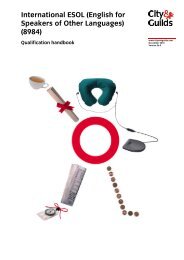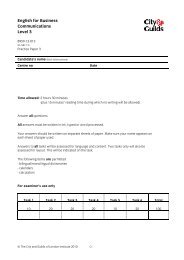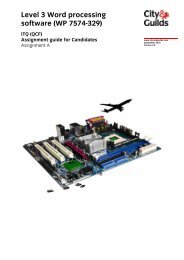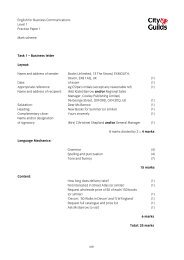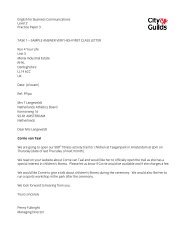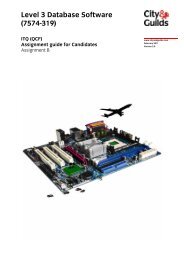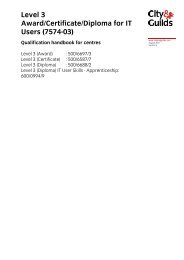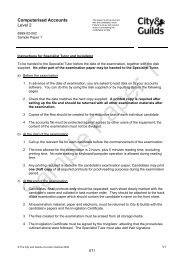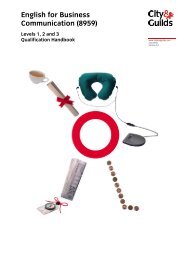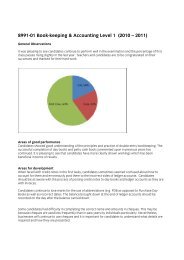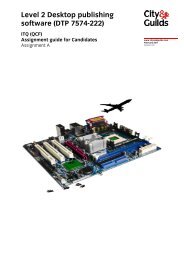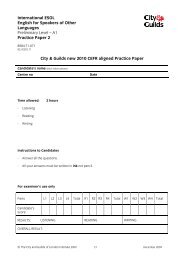Finance & Accounting - City & Guilds
Finance & Accounting - City & Guilds
Finance & Accounting - City & Guilds
Create successful ePaper yourself
Turn your PDF publications into a flip-book with our unique Google optimized e-Paper software.
<strong>City</strong> & <strong>Guilds</strong><br />
<strong>Accounting</strong> portfolio launch
Agenda slide<br />
1. Introductions<br />
2. Information on new qualifications<br />
3. Computerised Accounts<br />
4. Business <strong>Finance</strong><br />
5. Book-keeping and Accounts<br />
6. Support materials<br />
7. Plenary
1. Introductions
2. Information on new qualifications
Computerised Accounts (8989)<br />
• Level 1-3 Award in Computerised Accounts (8989)<br />
• Replaces 8956 which expired on 30 September 2008<br />
• Guided Learning Hours<br />
Level 1 – 30 GLH<br />
Level 2 – 30 GLH<br />
Level 3 – 60 GLH
Business <strong>Finance</strong> (8990)<br />
• Level 1-3 Award in Business <strong>Finance</strong> (8990)<br />
• Guided Learning Hours<br />
Level 1 – 30 GLH<br />
Level 2 – 30 GLH<br />
Level 3 – 60 GLH
Book-keeping and Accounts (8991)<br />
• Level 1-2 Award in Book-keeping and Accounts (8991)<br />
• Level 3 Award in <strong>Accounting</strong> and Book-keeping (8991)<br />
• Replaces 8953 which expired on 30 September 2008<br />
• Guided Learning Hours<br />
Level 1 – 30 GLH<br />
Level 2 – 30 GLH<br />
Level 3 – 60 GLH
Withdrawn qualifications<br />
• Qualifications that are no longer available after December 2008:<br />
Level 3 <strong>Accounting</strong> (8950)<br />
Level 1 and 2 Commercial Numeracy (8955)<br />
Level 3 Cost and Management <strong>Accounting</strong> (8957)
Examination fees<br />
• All single subject qualifications follow the same fee structure<br />
Level 1 - £22.00<br />
Level 2 - £24.00<br />
Level 3 - £28.00
Qualifications Credit Framework (QCF)<br />
• The new qualifications will be on the QCF NOT the NQF<br />
• Qualifications will be fundable<br />
• NQF will no longer exist from September 2010<br />
• For further details on the QCF please visit www.qca.org.uk
3. Computerised Accounts (8989)
Changes to Level 1 Computerised Accounts<br />
• Nothing has been removed
Additions to Level 1 Computerised Accounts<br />
• Use of Cash Account as well as Bank Account<br />
• Introduction of capital to both Bank A/C and Cash A/C<br />
• Process Bank Payments<br />
• Nominal Ledger printouts (Bank A/C and Cash A/C)
Changes to examination<br />
• Reading time 5 minutes
Changes to Level 2 Computerised Accounts<br />
• Removal of:<br />
Handwritten batch control sheets<br />
Introduction of capital to both Bank and Cash (now L1)
Additions to Level 2 Computerised Accounts<br />
• Prepare, process and print a service invoice<br />
• Transfer between Bank A/C and Cash A/C<br />
• Process returned cheque or cancelled cheque<br />
• Nominal journal entries<br />
• Process wages journal<br />
• Aged debtor / aged creditor analysis<br />
• Day book printout<br />
• Print remittance advice<br />
• Print customer statement
Changes to examination<br />
• Examination time 1 hour 30 minutes<br />
• Reading time 5 minutes
Changes to Level 3 Computerised Accounts<br />
• Nothing has been removed
Additions to Level 3 Computerised Accounts<br />
• Bank reconciliation statement
Changes to examination<br />
• Reading time 5 minutes
4. Business <strong>Finance</strong> (8990)
Level 1 Business <strong>Finance</strong><br />
• Provides an introduction to numerical and financial skills used<br />
in the workplace<br />
• Focus on the business application of numerical skills<br />
• The essential skills of Commercial Numeracy are retained as<br />
they relate to a business context
Level 1 Business <strong>Finance</strong><br />
• Assessment will have a financial bias (e.g. calculations of<br />
invoices, payroll calculations)<br />
• Test of knowledge over syllabus assessed by:<br />
- 10 short answer questions<br />
- Application of knowledge tested in<br />
- 4 longer tasks<br />
• Forms for completion will be provided on the examination<br />
paper
Level 1 Business <strong>Finance</strong><br />
• The following scenarios will be used to assess application of<br />
numerical skills and understanding of business finance<br />
- Calculations involving prices, price extensions, discounts sales<br />
tax in the context of orders<br />
- Job costs or estimates involving materials, labour costs and<br />
expenses<br />
- Calculation of gross and net pay and cash analysis<br />
- Graphical representation of performance indicators (e.g.<br />
sales, customer complaints)
Level 2 Business <strong>Finance</strong><br />
• Concerned with the application of numerical skills to<br />
management information for planning and control<br />
• Candidates expected to use raw data and present it as useful<br />
information in contexts of:<br />
- Budgets<br />
- Costing<br />
- Stock control and valuation<br />
- Credit control<br />
- Performance indicators
Level 2 Business <strong>Finance</strong><br />
• Some technical understanding of accounting, finance and<br />
costing is required in addition to numeracy<br />
• The assessment will be largely mechanical involving the<br />
preparation of information and completion of forms<br />
• Some ability to interpret results will be required but the focus is<br />
on preparing information for management
Level 3 Business <strong>Finance</strong><br />
• Continues with application of numerical skills but with a focus<br />
on providing information in a form suitable for decision making<br />
and problem solving by management<br />
• Typical tasks assessed will include:<br />
- Allocation, apportionment and absorption of overhead costs<br />
- Variance analysis in standard costing<br />
- Marginal costing<br />
- Break-even<br />
- Capital investment appraisal
Level 3 Business <strong>Finance</strong><br />
• Some of the technical areas of Cost and Management<br />
<strong>Accounting</strong> retained<br />
• Addition of techniques involved in providing information for<br />
management decision making and problem solving<br />
• Candidates will be expected to interpret and analyse<br />
information and make recommendations<br />
• Communication skills may be tested through presentation of<br />
findings by memoranda, short reports, charts, tables, graphs
5. Book-keeping and Accounts (8991)
Changes to Level 1 Book-keeping and Accounts<br />
• Removal of:<br />
Short written questions<br />
Trading, profit and loss accounts<br />
Balance sheets<br />
• Mapped to National Occupational Standards for <strong>Accounting</strong>
Additions to Level 1 Book-keeping and Accounts<br />
• Day books<br />
• Calculations – sales tax and purchase tax<br />
• Calculations – trade discounts and settlement discounts<br />
• Three column cashbook<br />
• Sales and purchase returns<br />
• Preparation and checking of source documents, plus other<br />
business documents and forms<br />
• Greater emphasis on completion of source documents and<br />
checking information for errors in calculation
Changes to examination<br />
• Larger number of tasks<br />
• Scenario based<br />
• Completion on the prepared exam paper
Changes to Level 2 Book-keeping and Accounts<br />
• Removal of:<br />
Conventional trading, profit and loss accounts<br />
Conventional balance sheet<br />
• Mapped to National Occupational Standards for <strong>Accounting</strong>
Additions to Level 2 Book-keeping and Accounts<br />
Extended trial balance with adjustments for:<br />
• accruals<br />
• prepayments<br />
• bad debts<br />
• doubtful debts<br />
• depreciation<br />
• closing stock
Additions to Level 2 Book-keeping and Accounts<br />
<strong>Accounting</strong> for capital expenditure and depreciation<br />
• ability to distinguish capital and revenue expenditure<br />
• preparation of ledger accounts for depreciation<br />
Year end adjustments<br />
• ledger accounts for accruals and prepayments<br />
• ledger accounts for bad and doubtful debts<br />
• journal adjustments<br />
• preparation of a trial balance (from one that is initially<br />
incorrect)
Changes to examination<br />
• Larger number of tasks<br />
• Scenario based<br />
• Completion on the prepared exam paper<br />
• Major task will be the completion of an extended trial balance
Changes to Level 3 Book-keeping and Accounts<br />
• Removal of:<br />
Cash flow forecasts<br />
• Mapped to National Occupational Standards for <strong>Accounting</strong>
New Level 3 syllabus<br />
• Emphasis will be placed on the completion of different<br />
aspects of final accounts for a range of organisations rather<br />
than, for example, three balance sheets covering<br />
partnerships, limited companies and clubs and societies.
Level 3 Book-keeping and Accounts examination<br />
• Larger number of tasks<br />
• Completion on the prepared exam paper<br />
• Less repetition of tasks allowing for greater testing of<br />
understanding
6. Support materials
Support materials<br />
• Qualification handbook<br />
• Sample papers<br />
• Examination Support Guide<br />
• FAQs<br />
• Downloadable from www.cityandguilds.com
7. Plenary
Further details<br />
<strong>City</strong> & <strong>Guilds</strong><br />
1 Giltspur Street<br />
London<br />
EC1A 9DD<br />
T +44 (0)20 7294 8133<br />
F +44 (0)20 7294 2414<br />
www.cityandguilds.com




